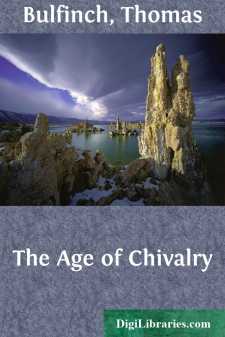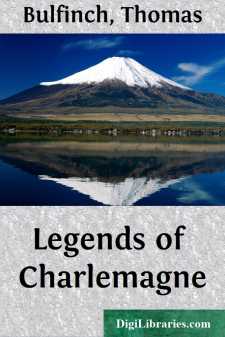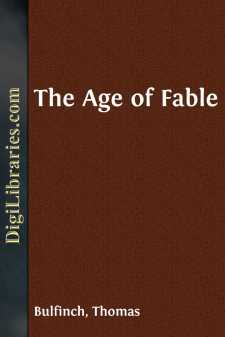Categories
- Antiques & Collectibles 13
- Architecture 36
- Art 48
- Bibles 22
- Biography & Autobiography 813
- Body, Mind & Spirit 142
- Business & Economics 28
- Children's Books 17
- Children's Fiction 14
- Computers 4
- Cooking 94
- Crafts & Hobbies 4
- Drama 346
- Education 46
- Family & Relationships 57
- Fiction 11829
- Games 19
- Gardening 17
- Health & Fitness 34
- History 1377
- House & Home 1
- Humor 147
- Juvenile Fiction 1873
- Juvenile Nonfiction 202
- Language Arts & Disciplines 88
- Law 16
- Literary Collections 686
- Literary Criticism 179
- Mathematics 13
- Medical 41
- Music 40
- Nature 179
- Non-Classifiable 1768
- Performing Arts 7
- Periodicals 1453
- Philosophy 64
- Photography 2
- Poetry 896
- Political Science 203
- Psychology 42
- Reference 154
- Religion 513
- Science 126
- Self-Help 84
- Social Science 81
- Sports & Recreation 34
- Study Aids 3
- Technology & Engineering 59
- Transportation 23
- Travel 463
- True Crime 29
The Age of Chivalry
by: Thomas Bulfinch
Categories:
Description:
Excerpt
No new edition of Bulfinch's classic work can be considered complete without some notice of the American scholar to whose wide erudition and painstaking care it stands as a perpetual monument. "The Age of Fable" has come to be ranked with older books like "Pilgrim's Progress," "Gulliver's Travels," "The Arabian Nights," "Robinson Crusoe," and five or six other productions of world-wide renown as a work with which every one must claim some acquaintance before his education can be called really complete. Many readers of the present edition will probably recall coming in contact with the work as children, and, it may be added, will no doubt discover from a fresh perusal the source of numerous bits of knowledge that have remained stored in their minds since those early years. Yet to the majority of this great circle of readers and students the name Bulfinch in itself has no significance.
Thomas Bulfinch was a native of Boston, Mass., where he was born in 1796. His boyhood was spent in that city, and he prepared for college in the Boston schools. He finished his scholastic training at Harvard College, and after taking his degree was for a period a teacher in his home city. For a long time later in life he was employed as an accountant in the Boston Merchants' Bank. His leisure time he used for further pursuit of the classical studies which he had begun at Harvard, and his chief pleasure in life lay in writing out the results of his reading, in simple, condensed form for young or busy readers. The plan he followed in this work, to give it the greatest possible usefulness, is set forth in the Author's Preface.
"Age of Fable," First Edition, 1855; "The Age of Chivalry," 1858;
"The Boy Inventor," 1860; "Legends of Charlemagne, or Romance of
the Middle Ages," 1863; "Poetry of the Age of Fable," 1863;
"Oregon and Eldorado, or Romance of the Rivers,"1860.
In this complete edition of his mythological and legendary lore "The Age of Fable," "The Age of Chivalry," and "Legends of Charlemagne" are included. Scrupulous care has been taken to follow the original text of Bulfinch, but attention should be called to some additional sections which have been inserted to add to the rounded completeness of the work, and which the publishers believe would meet with the sanction of the author himself, as in no way intruding upon his original plan but simply carrying it out in more complete detail. The section on Northern Mythology has been enlarged by a retelling of the epic of the "Nibelungen Lied," together with a summary of Wagner's version of the legend in his series of music-dramas. Under the head of "Hero Myths of the British Race" have been included outlines of the stories of Beowulf, Cuchulain, Hereward the Wake, and Robin Hood. Of the verse extracts which occur throughout the text, thirty or more have been added from literature which has appeared since Bulfinch's time, extracts that he would have been likely to quote had he personally supervised the new edition.
Finally, the index has been thoroughly overhauled and, indeed, remade. All the proper names in the work have been entered, with references to the pages where they occur, and a concise explanation or definition of each has been given. Thus what was a mere list of names in the original has been enlarged into a small classical and mythological dictionary, which it is hoped will prove valuable for reference purposes not necessarily connected with "The Age of Fable."
Acknowledgments are due the writings of Dr. Oliver Huckel for information on the point of Wagner's rendering of the Nibelungen legend, and M. I. Ebbutt's authoritative volume on "Hero Myths and Legends of the British Race," from which much of the information concerning the British heroes has been obtained
AUTHOR'S PREFACE
If no other knowledge deserves to be called useful but that which helps to enlarge our possessions or to raise our station in society, then Mythology has no claim to the appellation....




